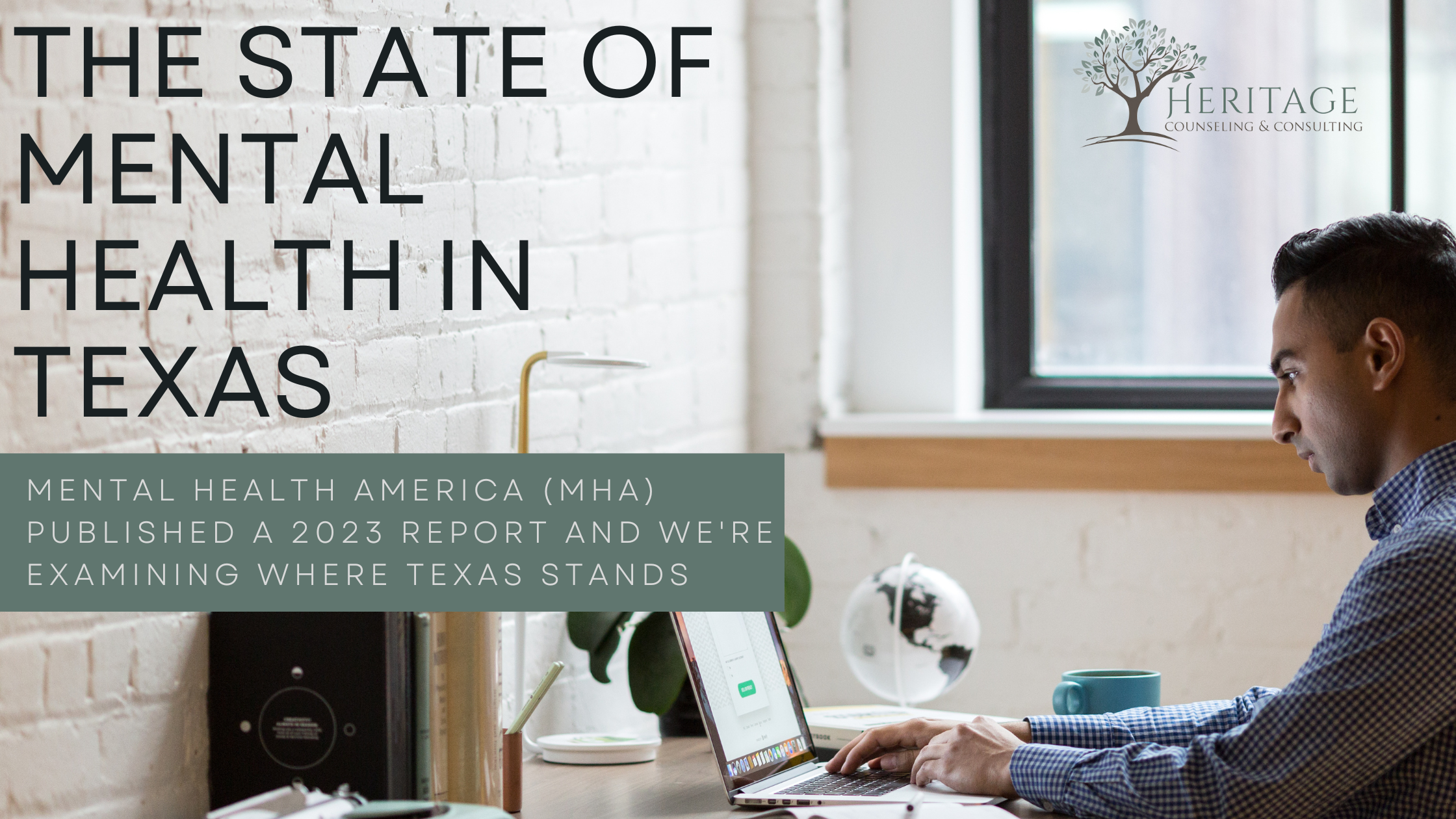Mental Health America (MHA), the nation’s leading community-based nonprofit committed to focusing on the needs of those living with mental health disorders, has released a 2023 report of The State of Mental Health in America. * They collected information across all 50 states and the District of Columbia to provide a glimpse of state and national mental health among adults and youth. Measuring community health needs and care access using national survey data, gathered through 2020, allowed MHA to rank states, showing which were most effective at tackling mental health issues. Unfortunately, Texas ranked 46th overall, indicating a high prevalence of mental illness with a low rate of access to care compared to other states.
Key Findings from the 2023 report are as follows: **
21% of adults, equating to over 50 million Americans, suffered from a mental illness in 2019-2020. Texans populate over 3.8 million of those Americans.
Texas ranked last in access to care rankings, indicating how much mental health care access exists within a state. The access measure includes access to treatment, insurance, quality and cost of insurance, special education services, and mental health workforce availability.
The vast majority of individuals with a substance use disorder in the U.S. are not receiving treatment. 15% of adults had a substance use disorder in the past year. Of those, 94% did not receive any form of care.
Millions of adults in the U.S. experience serious thoughts of suicide, with the highest rate among multiracial individuals. The percentage of adults reporting serious thoughts of suicide is 4.84%, totaling over 12.1 million individuals. 11% of adults who identified with two or more races reported serious thoughts of suicide in 2020 – 6% higher than the average among all adults. Texas ranks below the average (ranked #3), with 4.12% of adults reporting serious thoughts of suicide.
Over 1 in 10, youth in the U.S. are experiencing depression that is severely impairing their ability to function at school or work, at home, with family, or in their social life. 16.39% of youth (age 12-17) report suffering from at least one major depressive episode (MDE) in the past year. 11.5% of youth (over 2.7 million youth) are experiencing severe major depression. Texas is in line with the national average.
Over half (54.7%) of adults with a mental illness do not receive treatment, totaling over 28 million individuals. In Texas (ranked #47), over 6 in 10 adults with a mental illness did not receive care.
Almost a third (28.2%) of all adults with a mental illness reported that they were not able to receive the treatment they needed. 42% of adults with any mental illness reported they were unable to receive necessary care because they could not afford it. Texas is slightly above the national average at 29.6%.
10.8% (over 5.5 million) of adults with mental illness are uninsured. Hispanic adults with any mental illness (AMI) were least likely to have health insurance, with 19% reporting they were not covered by insurance. Texas ranked 50th with over 21% of its residents with AMI uninsured. As of 2019-2020, Texas had not expanded Medicaid, which may explain why so many in Texas are uninsured for mental health care.
6.34% of youth in the U.S. reported a substance use disorder in the past year. That is equivalent to over 1.5 million youth in the U.S. who meet the criteria for an illicit drug or alcohol use disorder.
22.87% of adults who report experiencing 14 or more mentally unhealthy days each month were not able to see a doctor due to costs. In Texas (ranked 49), over one-third of adults experiencing frequent mental distress are unable to afford a doctor’s visit.
59.8% of youth with major depression do not receive any mental health treatment. Asian youth with major depression were least likely to receive specialty mental health care, with 78% reporting they did not receive mental health services in the past year. In Texas, the 2nd to last ranked state behind South Carolina, three-quarters of youth with major depression did not receive mental health services. That’s nearly 8 in 10 youth who receive no care.
Nationally, only 28% of youth with severe depression receive some consistent treatment (7-25+ visits in a year). Most (57.3%) youth with severe depression do not receive any care. In Texas, only 13% of youth with depressive episodes that have severely impacted functioning receive consistent care.
Nationally, 1 in 10 youth who are covered under private insurance do not have coverage for mental or emotional difficulties – totaling over 1.2 million youth. In Texas (ranked 50), nearly 1 in 5 youth with private insurance do not have coverage for mental health care.
Only .718 percent of students are identified with emotional disturbance for an individualized education program (IEP). IEPs, with sufficient resources for schools and teachers, are critical for ensuring that youth with disabilities can receive the individualized services, support, and accommodations to succeed in a school setting. Texas is in line with this average.
In the U.S., there are an estimated 350 individuals for every 1 mental health provider. However, these figures may be an overestimate of active mental health professionals, as they may include providers who are no longer practicing or accepting new patients. Texas is poorly ranked 50th with one mental health worker per 760 people.
While Texas may rank poorly in access to mental health care and the number of health care providers available, the growing team at Heritage Counseling & Consulting is ready to provide a variety of mental health treatments including in-person and virtual counseling appointments with a diversity of talented clinicians. Additionally, we provide Psychological Evaluations, such as ADD/ADHD and Autism Testing, and non-invasive alternative treatment options like Neurofeedback Therapy. If you want to improve your mental health and meet a clinician who cares about your goals, please contact Heritage Counseling & Consulting at 214-363-2345.
* Reinert, M, Fritze, D. & Nguyen, T. (October 2022). “The State of Mental Health in America 2023” Mental Health America, Alexandria VA.
** www.mhanational.org/issues/state-mental-health-america

